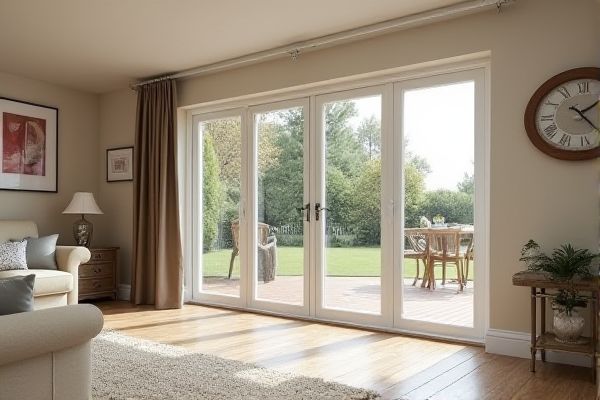
Panel doors offer a classic, sturdy design with solid construction ideal for privacy and durability, while bi-fold doors maximize space efficiency and provide a modern look with their folding mechanism, perfect for areas with limited room. Discover which door style best suits your space and preferences by exploring the full comparison in the rest of the article.
Table of Comparison
| Feature | Panel Doors | Bi-Fold Doors |
|---|---|---|
| Design | Single or multiple solid panels with raised or recessed detail | Multiple narrow panels hinged to fold back |
| Space Efficiency | Requires clearance to swing open | Folds to minimize space usage |
| Installation | Standard, easy to install on most openings | Requires tracks and special hinges |
| Use Cases | Interior rooms, closets, entrances | Closets, laundry rooms, small spaces |
| Durability | Sturdy with less moving parts | More moving parts can wear out over time |
| Cost | Generally more affordable | Typically higher due to hardware and installation |
| Aesthetic | Classic and versatile | Modern and space-saving |
Introduction to Panel and Bi-Fold Doors
Panel doors consist of solid or hollow frames with multiple panels that enhance structural strength and aesthetic appeal, commonly used in traditional and modern interiors. Bi-fold doors feature hinged panels that fold back to one or both sides, maximizing space and providing seamless indoor-outdoor transitions. Your choice between these doors impacts room functionality, style, and spatial efficiency based on opening mechanisms and design preferences.
Design and Aesthetic Appeal
Panel doors offer a classic and sturdy appearance characterized by solid frames and recessed or raised panels that enhance traditional or modern interiors. Bi-fold doors provide a sleek, space-saving design with multiple narrow panels folding neatly to one side, creating seamless transitions between indoor and outdoor areas. Your choice between these door styles will significantly impact the overall aesthetic, with panel doors emphasizing elegance and solidity, while bi-fold doors promote openness and contemporary flair.
Space Efficiency and Room Layout
Panel doors offer a traditional swinging mechanism that requires clear floor space for full operation, potentially limiting furniture placement and room layout options. Bi-fold doors fold back against themselves, maximizing space efficiency by occupying less clearance when opened, ideal for tight or compact areas. Your choice between these door types significantly impacts room functionality and the effective use of available space.
Installation Process and Complexity
Panel doors typically require a straightforward installation process involving standard hinges and precise alignment within a door frame, making them suitable for DIY projects or basic professional setups. Bi-fold doors involve a more complex installation, requiring track systems, pivot hinges, and careful calibration to ensure smooth folding and alignment, often necessitating professional expertise. The complexity of bi-fold door installation can increase labor time and potential for adjustment, while panel doors generally provide a quicker, less complicated setup.
Durability and Maintenance
Panel doors offer superior durability due to their solid construction, often made from hardwood or engineered wood, which resists warping and damage over time. Bi-fold doors feature multiple hinges and moving parts that require regular maintenance, including lubrication and alignment adjustments, to ensure smooth operation. In terms of long-term upkeep, panel doors typically demand less frequent repairs and cleaning compared to the more mechanically complex bi-fold doors.
Cost Comparison: Panel vs Bi-Fold Doors
Panel doors generally offer a lower upfront cost compared to bi-fold doors due to simpler construction and fewer moving parts. Bi-fold doors, while typically more expensive, provide greater flexibility and space-saving benefits, which may justify the higher investment depending on your room layout. Your decision should balance initial expenses with the long-term functionality and aesthetic appeal each door type brings to your home.
Functionality and Usability
Panel doors offer sturdy construction and ease of use with a straightforward swinging mechanism, making them ideal for rooms requiring privacy and sound insulation. Bi-fold doors maximize space efficiency by folding neatly to the side, providing wide access and enhanced ventilation, which is perfect for closets and connecting indoor-outdoor areas. You can choose based on whether you prioritize space-saving functionality or traditional usability in your home design.
Material Options and Customization
Panel doors offer a wide range of material options including solid wood, MDF, and composite materials, allowing for extensive customization in finishes, panel styles, and decorative details to match your interior design. Bi-fold doors commonly feature lightweight materials such as aluminum, uPVC, or timber with glazed panels, providing flexibility in size, color, and glass type for enhanced natural light and space-saving functionality. Your choice between panel and bi-fold doors should consider the balance between aesthetic preferences and material durability tailored to your space requirements.
Ideal Applications and Room Types
Panel doors offer ideal applications in traditional and formal spaces such as living rooms, bedrooms, and offices, providing robust privacy and classic aesthetics. Bi-fold doors are perfect for maximizing space in areas like closets, laundry rooms, and small kitchens, as they fold back to save room and allow easy access. Both door types can be selected based on spatial constraints and design preferences, with panel doors favoring broader room divisions and bi-fold doors enhancing functional flow in compact environments.
Pros and Cons Summary: Panel vs Bi-Fold Doors
Panel doors offer superior insulation and security with a classic aesthetic, making them ideal for traditional home designs. Bi-fold doors maximize space and provide a wide, unobstructed opening, enhancing indoor-outdoor flow but may compromise on insulation and durability. Your choice depends on prioritizing energy efficiency and security or maximizing space and natural light.
 homyna.com
homyna.com